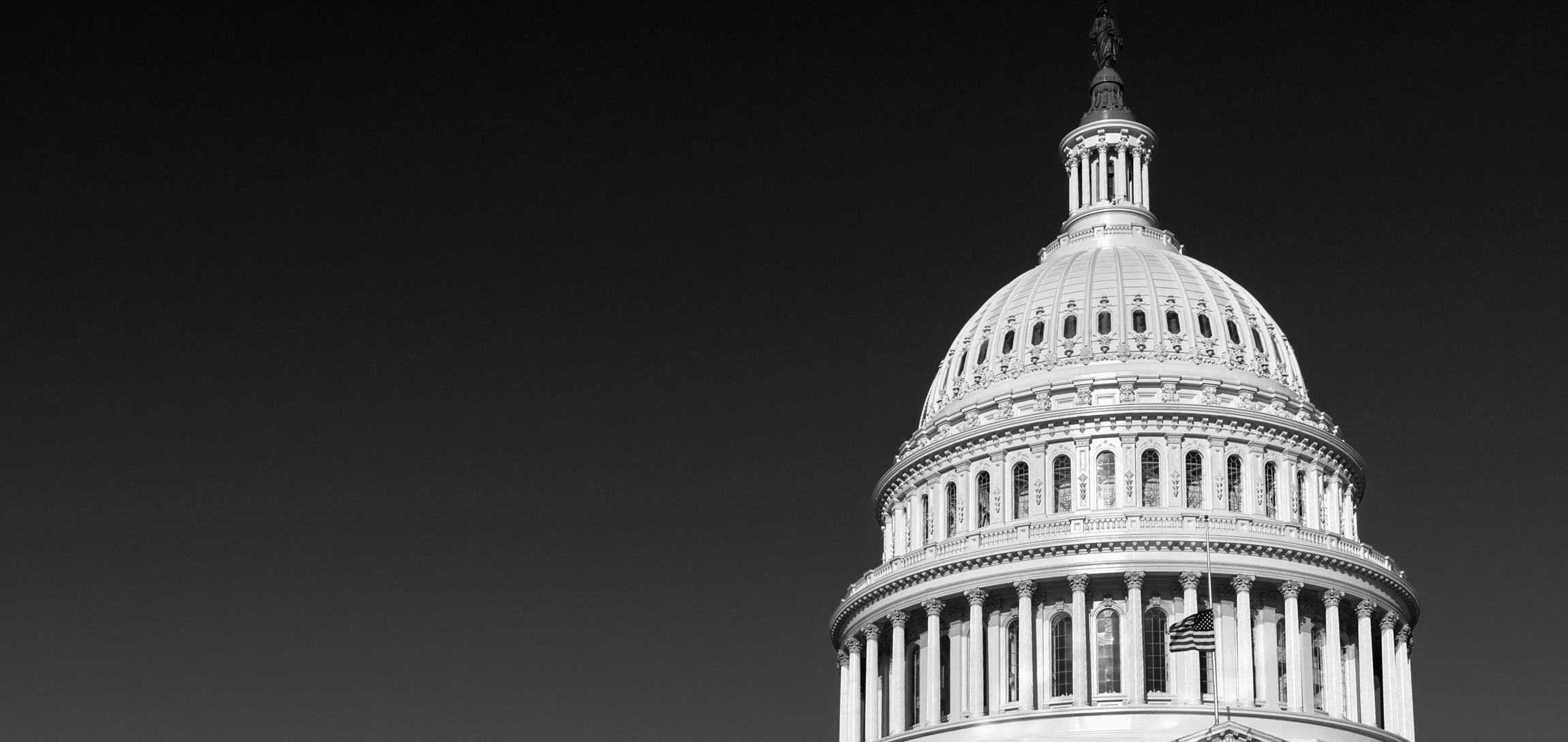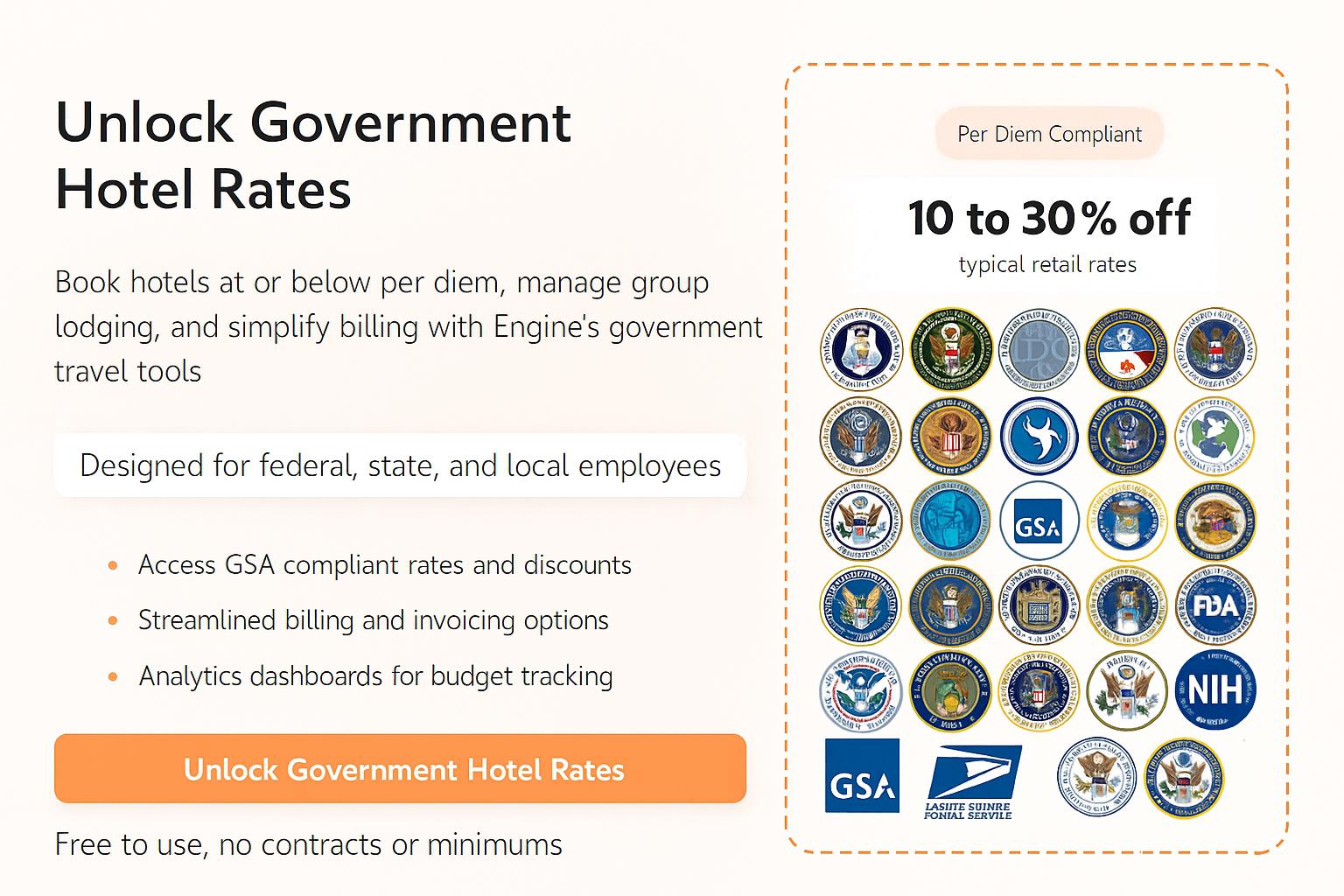Accessing government rates for your hotel stays: how it works and who qualifies

Accessing government rates at hotels requires eligibility and proof of official travel. Engine is built for business and government travelers, helping you book per-diem-friendly rooms with clear documentation requirements.
Government hotel rates are special pricing plans that hotels publish for eligible public sector travelers on official business. These rates are often designed to align with federal per diem limits for a city and date, but availability varies by brand, location, and demand. And yes, sometimes even government employees and contractors traveling for personal reasons will take advantage of their position to access these special rates.
Many hotels publish a special “Government” or “GSA” rate plan intended for official travel by eligible public sector travelers. Properties often aim to price these rates at or below the federal per diem lodging ceiling for that city and date range, but availability is never guaranteed and not every hotel participates. For federal travel inside the continental U.S. (CONUS), lodging taxes are not part of the per diem lodging cap and are handled separately for reimbursement.

Who is typically eligible for these special rates
Eligibility depends on the specific rate plan and property rules. Most hotels ask for proof of official business and reserve the right to verify at check in, some hotels will accept your government ID or government Email as proof enough. Some hotels will even take you at your word, it really varies from property to property.
- U.S. federal civilian employees traveling on official business, with valid agency ID and travel authorization.
- Active duty U.S. military and DoD civilians on Temporary Duty (TDY) or other official orders. In certain locations, DoD travelers must first use DoD Preferred lodging before booking other commercial options.
- State and local government employees on official business, typically with a government ID. Acceptance varies by brand and property.
- Government contractors on official business when the contract or agency policy allows travel at or up to per diem limits. Proof often includes company ID plus a letter of authorization or contract reference. Reimbursement rules generally align to federal ceilings.
Edge cases: Some properties extend similar pricing to first responders or to military on leisure. Those are brand or hotel specific “military” or “first responder” promos, not federal “government” rates. Always check the specific rate plan terms.

What documentation hotels usually ask for (updated)
Document requirements are meant to confirm eligibility and purpose of travel. Bring what you need to satisfy both booking and check in, since enforcement is done at the property.
- Government or military photo ID at check in. This is commonly required by major brands.
- Official travel orders or authorization when the rate is restricted to “official business only.” This can be property specific.
- A government issued email address is often accepted to unlock or pre validate the rate when booking online. Examples include .gov and .mil, as well as state or local domains such as @state.ca.us or @cityoftampa.com. You should still bring your ID, since most hotels verify at check in.
- For contractors, company ID plus a contract reference or letter of authorization if the property asks. Policies vary by chain and location.
- Tax exemption forms, if applicable to the state and payment method. Some states require a specific certificate.
How per diem interacts with hotel rates
Per diem sets a ceiling for reimbursable lodging on official travel. It does not guarantee that a per diem priced room will be available on every date or in every neighborhood.
- Per diem is a ceiling, not a promise of availability. Hotels may sell out of per diem priced inventory on busy dates.
- In CONUS, lodging taxes are excluded from the lodging per diem and are reimbursable separately under the Federal Travel Regulation.
- Tax exemption depends on state rules and on the payment method. Some states require specific forms or IDs to waive taxes.

Military and DoD specifics
Service members and DoD civilians follow additional rules that can affect where they book and how they get reimbursed. Check orders and local guidance before choosing a hotel.
- For TDY at certain locations, Integrated Lodging Program rules require booking DoD Preferred lodging first. If unavailable, you may use commercial hotels at or below per diem. Keep orders handy.
- The Joint Travel Regulations set allowances and compliance requirements for service members and DoD civilians.
When you are not eligible
Government rates at hotels are intended for official business only. Using them for personal travel or without the required proof can lead to a rate change at check in. That said, it's a bit of a grey area as the hotels themselves have a hard time determining who is on official business and who is not. A hotel front desk worker only has so much bandwidth.
- Personal trips, leisure, or family travel when you are not on official orders or authorized government business.
- Using a government rate without proper ID or documentation. Many hotels perform ID checks and can change the rate at check in.
Extended stays and long assignments
Longer assignments benefit from properties that include kitchens and laundry. These features help travelers manage costs, stay organized, and remain within policy.
- On multi week TDYs, extended stay hotels often price at or below per diem and include kitchens and on site laundry, which helps you stay within M&IE limits.
- For stays longer than a month, some properties switch to monthly pricing. If it beats the nightly per diem math, your approver may still require documentation to use actual expense or a negotiated long stay rate that is consistent with policy. Federal reimbursement must still follow FTR or JTR rules.
Quick checklist before you book
A short pre booking check helps avoid headaches at check in and speeds up reimbursement later.
- Confirm the property offers a Government or GSA rate for your dates.
- Verify you meet the eligibility for that specific rate plan.
- Book under the Government rate code.
- Bring ID and, if required, orders or authorization.
- Check state tax exemption requirements and bring any forms.



.jpg)







.jpg)




![What is an OBT? [+ Why They Matter]](https://cdn.prod.website-files.com/66a41388b1be9ba182f1e80c/66f97c4190ac5e26bea90c05_66a41388b1be9ba182f1efc0_online-booking-tool.avif)


![How to Get the Best Hotel Deals and Rewards [Infographic]](https://cdn.prod.website-files.com/66a41388b1be9ba182f1e80c/66a41388b1be9ba182f1f257_Windsor_Hotel_-_in_winter.avif)




